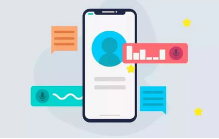- 阅读
- 阅读
- 技巧
- 百科
- 试题
- 文化
- 技能
Leaders
社论
Identity
身份
Les stats, C'est moi
统计数据,就是我
A new way to think about data is needed
需要用新方法看待数据

Yet few have changed their online behaviour, boycotted snooping tech firms or exercised what few digital rights they possess. Partly this is because managing your own data is time consuming and complex, even for those who understand how to do it. But it is also because of a misunderstanding of what is at stake. “Data” is an abstract concept, technical and intangible. Far more solid is the idea of identity. It is only when “data” is understood to mean “people” that individuals will demand accountability from those who seek to know them.
但很少有人改变自己的网上行为,很少有人抵制窥探技术公司,或者行使他们所拥有的为数不多的数字权利。部分原因是,管理自己的数据既费时又复杂,即使对那些知道如何管理数据的人来说也是如此。但还因为得失难料。“数据”是一个抽象的概念,具有技术性和无形性。更可靠的是身份的概念。只有“数据”被理解为“人”的代表时,个人才会让向试图向了解他们的人问责。
Such accountability stretches far beyond an obligation to secure someone’s credit-card details. In the information age, data are used to decide what sort of access people have to services. Uber ratings determine who gets a taxi; Airbnb reviews decide what sort of property you can stay in; dating-app algorithms choose your potential life partners. Firms use location data and payment history to sell you products. Your online searches may establish the price you pay for things. Those with a good Zhima credit score, administered by an Alibaba subsidiary, enjoy discounts and waived deposits. Those without receive few offers.
这种责任远远超出了确保某人信用卡详细信息安全的义务。在信息时代,数据决定人们对服务的访问方式。优步上的排名决定谁能打到车;爱彼迎的评论决定你可以住什么样的房子;约会应用程序算法选择你潜在的生活伴侣。公司利用位置数据和支付历史向你推销产品。你在网上的搜索可能会决定购买商品的价格。由阿里巴巴子公司管理的“芝麻”信用评分良好的客户可以享受折扣和免押金服务。“芝麻”信用评分不好的客户则享受不到这样的服务。
When they are used by states, such techniques pose a still greater threat. Algorithms that are able to recognise patterns in data can pinpoint dissidents or even those with unconventional opinions. In 2012 Facebook experimented with using data to manipulate emotions. In 2016 Russia used data to influence the American presidential election. The question is not whether someone is doing something wrong. It is whether others can do wrong to them.
而这些技术用于国家层面的话,就会构成更大的威胁。能够识别数据模式的算法也能找出持不同政见者,甚至是那些持非传统观点的人。2012年,脸书尝试使用数据来操纵用户的情绪。2016年,俄罗斯利用数据影响美国总统大选。问题不在于某人是否做错了什么。关键是别人是否能对他们做错事。
The fossils of past actions fuel future economic and social outcomes. Privacy rules, data-protection regulation and new laws surrounding the use of algorithms are crucial in protecting the rights of individuals. But the first step towards ensuring the fairness of the new information age is to understand that it is not data that are valuable. It is you.
过去行动如化石燃料般点燃未来的经济社会结果。隐私规则、数据保护条例和围绕算法使用的新法律对保护个人权利至关重要。但确保新信息时代公平的第一步,是要明白,有价值的不是数据。而是你这个人。
来源:经济学人
参与评论